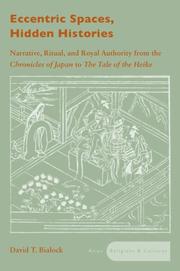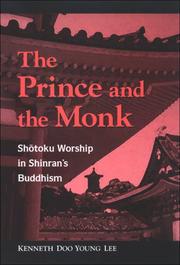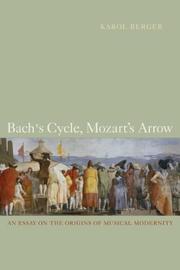| Listing 1 - 4 of 4 |
Sort by
|
Book

ISBN: 023113696X Year: 2007 Publisher: New York Columbia university press
Abstract | Keywords | Export | Availability | Bookmark
 Loading...
Loading...Choose an application
- Reference Manager
- EndNote
- RefWorks (Direct export to RefWorks)
J5511 --- J5700 --- J5920 --- J5910 --- Japan: Literature -- collections, series and anthologies -- premodern, earliest to Edo ( -1868) --- Japan: Literature -- poetry in general --- Japan: Literature -- premodern fiction and prose ( -1868) --- Japan: Literature -- fiction and prose -- anthologies, selections, series, sōsho --- Japanese literature

ISBN: 0804751587 9780804751582 0804767645 1435608801 9781435608801 Year: 2007 Publisher: Stanford, Calif. Stanford University Press
Abstract | Keywords | Export | Availability | Bookmark
 Loading...
Loading...Choose an application
- Reference Manager
- EndNote
- RefWorks (Direct export to RefWorks)
After 'The Tale of Genji' (c.1000), the greatest work of classical Japanese literature is the historical narrative 'The Tale of the Heike' (13th-14th centuries). In addition to opening up fresh perspectives on the Heike narratives, this study draws attention to a range of problems centred on the interrelationship between narrative, ritual space, and Japan's changing views of China as they bear on depictions of the emperor's authority, warriors, and marginal population going all the way back to the Nara period.
History in literature. --- Japanese literature --- Religion and literature --- History and criticism. --- Heike monogatari. --- J5500.10 --- J5920 --- Literature --- Literature and religion --- Japan: Literature -- history and criticism -- premodern, ancient and earliest --- Japan: Literature -- premodern fiction and prose ( -1868) --- Moral and religious aspects --- Tale of the Heike --- 平家物語 --- History in literature --- History and criticism

ISBN: 0791480461 1429465751 9781429465755 0791470210 0791470229 9780791470213 9780791470220 9780791480465 Year: 2007 Publisher: Albany State University of New York Press
Abstract | Keywords | Export | Availability | Bookmark
 Loading...
Loading...Choose an application
- Reference Manager
- EndNote
- RefWorks (Direct export to RefWorks)
The Prince and the Monk addresses the historical development of the political and religious myths surrounding Shōtoku Taishi and their influence on Shinran, the founder of the Jōdo-Shinshū school of Pure Land Buddhism. Shōtoku Taishi (574–622) was a prince who led the campaign to unify Japan, wrote the imperial constitution, and promoted Buddhism as a religion of peace and prosperity. Shinran's Buddhism developed centuries later during the Kamakura period, which began in the late twelfth century. Kenneth Doo Young Lee discusses Shinran's liturgical text, his dream of Shōtoku's manifestation as Kannon (the world-saving Bodhisattva of Compassion), and other relevant events during his life. In addition, this book shows that Shinran's Buddhism was consistent with honji suijaku culture—the synthesis of the Shinto and Buddhist pantheons—prevalent during the Kamakura period.
Shōtoku Taishi, --- Shinran, --- Zenshin, --- Kenshin, --- しんらん, --- 親鸞, --- Jōgū Taishi, --- 聖徳大子, --- 聖徳太子, --- 聖徳皇太子, --- 聖德太子, --- Cult. --- Shin Buddhists. --- Buddhists --- Pure Land Buddhists --- Shin (Sect) --- J1879 --- J2284.10 --- J1840 --- Japan: Religion -- Buddhism -- Jōdo shin (True pure land school) --- Japan: Genealogy and biography -- biographies -- earliest and premodern ( -645) --- Japan: Religion -- Buddhism -- rituals and practices --- Shotoku Taishi,

ISBN: 9780520250918 9780520933699 0520933699 0520250915 9780520257979 0520257979 128244574X 9786612445743 9781282445741 Year: 2007 Publisher: Berkeley University of California Press
Abstract | Keywords | Export | Availability | Bookmark
 Loading...
Loading...Choose an application
- Reference Manager
- EndNote
- RefWorks (Direct export to RefWorks)
In this erudite and elegantly composed argument, Karol Berger uses the works of Monteverdi, Bach, Mozart, and Beethoven to support two groundbreaking claims: first, that it was only in the later eighteenth century that music began to take the flow of time from the past to the future seriously; second, that this change in the structure of musical time was an aspect of a larger transformation in the way educated Europeans began to imagine and think about time with the onset of modernity, a part of a shift from the premodern Christian outlook to the modern post-Christian worldview. Until this historical moment, as Berger illustrates in his analysis of Bach's St. Matthew Passion, music was simply "in time." Its successive events unfolded one after another, but the distinction between past and future, earlier and later, was not central to the way the music was experienced and understood. But after the shift, as he finds in looking at Mozart's Don Giovanni, the experience of linear time is transformed into music's essential subject matter; the cycle of time unbends and becomes an arrow. Berger complements these musical case studies with a rich survey of the philosophical, theological, and literary trends influencing artists during this period.
Music --- History and criticism --- History and criticsm --- Bach, Johann Sebastian, --- Mozart, Wolfgang Amadeus, --- Criticism and interpretation. --- History and criticism. --- Mozart, Wolfgang Amadeus --- Mozart, Johannes Chrysostomus Wolfgangus Theophilus --- Bach, Johann Sebastian --- Bach, Jean-Sébastien --- Bakh, Iogann Sebastian, --- Bakh, Y. S., --- Bach, Jean Sébastien, --- Bach, G. S., --- Bach, Jan Sebastian, --- Bachas, J. S., --- Bach, J. S. --- Bahs, Johans Sebatjans, --- Pa-ha, Te, --- Bakh, Ĭ. S. --- Bakh, Ĭokhan Sebastian, --- Bach, Joh. Seb. --- Bakh, Yohan Sebasṭyan, --- Bach, Iohann Sebastian, --- Bahha, J. S., --- Bahha, Yohan Sebasutian, --- Bach, I. S., --- Bach, Juan S., --- Bach, John Sebastian, --- Bach, Giovanni Sebastiano, --- באך, יוהן סבסטיאן --- Mot︠s︡art, Volʹfgang Amadeĭ, --- Mōtsaruto, --- Mot︠s︡art, Iogann-Krizost Volʹfgang Gotlib, --- Mozart, Johann Chrysostom Wolfgang Amadeus, --- Mozart, W. A. --- Mozart, Wolfgango Amadeo, --- Mot︠s︡art, V. A. --- Mocartas, V. A., --- Motsart, Volphnkank Amedaios, --- Mot︠s︡art, Volfang Amadeus, --- Mozzart, Apollo, --- Mozart, Joannes Chrysostomus Wolfgangus Amadeus, --- Mozart, Johannes Chrisostomus Wolfgangus Theophilus, --- Mozhate, --- Моцарт, Вольфганг Амадей, --- מוצרט, --- מוצרט, וולפגנג אמדאוס, --- 莫札特, --- Mozart, Wolfgang Amadeusz, --- Mozart, W.A. --- Mot︠s︡art, Volʹfgang Amadeĭ --- Mot︠s︡art, Iogann-Krizost Volʹfgang Gotlib --- Mozart, Johann Chrysostom Wolfgang Amadeus --- Mozart, Wolfgango Amadeo --- Mocartas, V. A. --- Motsart, Volphnkank Amedaios --- Mot︠s︡art, Volfang Amadeus --- Mozzart, Apollo --- Mozart, Joannes Chrysostomus Wolfgangus Amadeus --- Mozart, Johannes Chrisostomus Wolfgangus Theophilus --- Mozhate --- Моцарт, Вольфганг Амадей --- Mozart, Wolfgang Amadeusz --- 18th century. --- academic. --- argument. --- artist. --- artistic trends. --- artistic. --- bach. --- beethoven. --- case studies. --- christian. --- christianity. --- classical composers. --- classical music. --- composers. --- don giovanni. --- historical. --- instrumental music. --- literary. --- monteverdi. --- mozart. --- music composers. --- musical composition. --- philosophical. --- philosophy. --- post christian. --- premodern. --- scholarly. --- st matthew passion. --- theology.
| Listing 1 - 4 of 4 |
Sort by
|

 Search
Search Feedback
Feedback About UniCat
About UniCat  Help
Help News
News